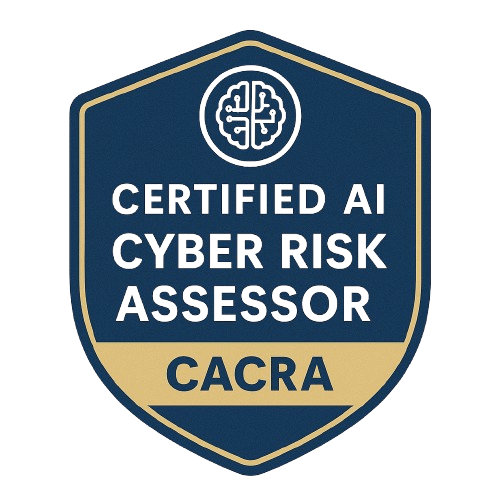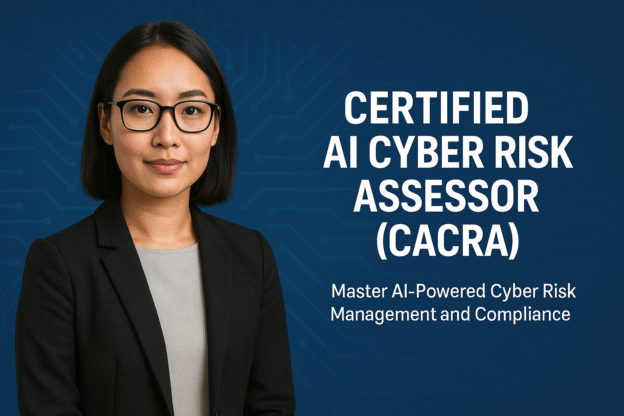AI Cyber Risk Assessor is quickly becoming one of the most in-demand roles in today’s digitally driven world. As artificial intelligence continues to reshape industries from finance to healthcare and defence to retail the importance of understanding and managing AI-related cyber risks has never been more critical.
Table of Contents
- Certified AI Cyber Risk Assessor (CACRA): Introduction
- Why the CACRA Certification Matters
- The Growing Demand for AI Cyber Risk Assessors
- Course Delivery: 100% Online and Flexible
- Course Modules in Detail
- Practical Tools and Portfolio Artefacts
- Case Studies on AI Cyber Risks
- Global Standards and Regulatory Alignment
- Final Exam and Certification Process
- Career Benefits of CACRA Certification
- How CACRA Compares to Other Cybersecurity Courses
- Enroll in the Certified AI Cyber Risk Assessor (CACRA) Today
Introduction
Certified AI Cyber Risk Assessor (CACRA) is the definitive credential for professionals who want to lead at the intersection of artificial intelligence and cybersecurity. As industries rapidly integrate AI into mission-critical systems, the risks of adversarial machine learning, data poisoning, and governance weaknesses are escalating.
The CACRA course equips learners with advanced frameworks, threat modelling skills, and compliance insights to identify, assess, and mitigate AI-specific cyber risks. Unlike generic cybersecurity certifications, CACRA is laser-focused on AI systems from generative AI platforms to autonomous vehicles making it one of the most future-proof qualifications available.
Why the CACRA Certification Matters
AI has transformed industries from healthcare and defence to finance and retail. But with innovation comes new vulnerabilities. AI models introduce unique attack surfaces, such as:
- Adversarial machine learning: Manipulating models with subtle data inputs.
- Data poisoning: Corrupting training datasets to bias outputs.
- Model inversion: Extracting sensitive training data.
- Governance gaps: Weak accountability, explainability, and auditability.
The Certified AI Cyber Risk Assessor (CACRA) course empowers professionals to tackle these risks head-on. By mastering AI-specific risk frameworks, graduates can help organisations stay secure, compliant, and competitive in a digital-first economy.
The Growing Demand for AI Cyber Risk Assessors
Global demand for AI Cyber Risk Assessors is skyrocketing. According to industry research, spending on AI-enabled cybersecurity solutions is projected to exceed USD 46 billion by 2027. At the same time, regulators are issuing new compliance requirements like the EU AI Act and the US Executive Order on AI Security.
Organisations need professionals who understand both AI algorithms and cyber risks. The CACRA certification positions graduates as trusted experts who can:
- Assess AI vulnerabilities.
- Audit third-party AI vendors.
- Build AI risk registers.
- Design incident response playbooks tailored for AI.
Visit our other strategy and management certifications
Course Delivery: 100% Online and Flexible
The Certified AI Cyber Risk Assessor (CACRA) course is offered fully online through The Case HQ’s interactive platform.
Benefits of delivery format:
- Flexibility: Study at your own pace without interrupting your career.
- Accessibility: Open to learners worldwide.
- Practical Focus: Includes simulations, templates, and scenario-based assessments.
The course blends lectures, risk modelling workshops, and applied assignments, ensuring learners are prepared for real-world AI risk challenges.
Course Modules in Detail
The CACRA curriculum is built around 10 structured modules, each containing 3 lessons, 2 templates, and 2 applied case studies:
- Foundations of AI Cyber Risk – Understanding AI attack surfaces.
- Adversarial Machine Learning – Detecting and mitigating manipulative inputs.
- Data Poisoning and Model Inversion – Securing datasets and training integrity.
- AI Risk Assessment Frameworks – NIST AI RMF, ISO/IEC 42001:2023.
- AI-Specific Threat Modelling – Developing attack trees for AI models.
- Third-Party AI Vendor Audits – Risk scoring and due diligence.
- AI Governance and Compliance – GDPR, AI Act, and ethical AI.
- Incident Response in AI Systems – Designing AI risk playbooks.
- Red-Team Testing and AI Audits – Stress-testing AI systems.
- AI Risk Communication and Reporting – Presenting risk findings to executives.
Each module balances theory with hands-on application, ensuring learners graduate with actionable expertise.
Practical Tools and Portfolio Artefacts
Participants in the Certified AI Cyber Risk Assessor (CACRA) course build a professional toolkit of resources, including:
- AI Risk Register Template
- Third-Party AI Vendor Audit Checklist
- Model Lifecycle Risk Assessment Framework
- AI Incident Response Playbook
- Red-Team Testing Plan Template
- AI Governance Gap Analysis Matrix
By course completion, learners will have a portfolio of artefacts to showcase their skills to employers.
Case Studies on AI Cyber Risks
Real-world case studies ensure learners can connect theory to practice. Examples include:
- Healthcare AI: Securing diagnostic AI from adversarial attacks.
- Finance: Preventing data poisoning in fraud detection models.
- Defence: Managing risks in autonomous military systems.
- Retail: Auditing third-party AI chatbots for compliance and bias.
These cases give learners practical insights into industry-specific AI threats.
Global Standards and Regulatory Alignment
The CACRA course aligns with global standards and frameworks, ensuring graduates are ready to meet compliance expectations. These include:
- ISO/IEC 42001:2023 – AI management systems.
- NIST AI Risk Management Framework – US-focused AI governance.
- GDPR – Protecting personal data in AI systems.
- EU AI Act – Regulating high-risk AI applications.
By mastering these standards, learners gain the ability to future-proof AI security strategies.
NIST AI Risk Management Framework)
Final Exam and Certification Process
Completion of the CACRA program requires passing a final exam that tests:
- AI-specific threat modelling.
- Risk register development.
- Regulatory compliance mapping.
- Incident response planning.
Graduates receive the Certified AI Cyber Risk Assessor (CACRA) credential, along with a digital badge for professional branding on LinkedIn and resumes.
Career Benefits of CACRA Certification
Earning the Certified AI Cyber Risk Assessor (CACRA) credential delivers multiple benefits:
- High employability in cybersecurity, governance, and risk roles.
- Career mobility across regulated industries (finance, healthcare, defence).
- Credibility with a globally benchmarked AI risk qualification.
- Practical readiness with portfolio artefacts employers value.
As AI adoption accelerates, AI Cyber Risk Assessors will be among the most in-demand professionals of the decade.
How CACRA Compares to Other Cybersecurity Courses
- CACRA vs. CISSP: CISSP covers general cybersecurity; CACRA focuses on AI-specific threats.
- CACRA vs. CISM: CISM emphasises management; CACRA blends management with AI technical risk expertise.
- CACRA vs. ISO/IEC Certifications: CACRA provides practical AI-focused artefacts, not just theory.
This makes CACRA the only certification dedicated exclusively to AI cyber risk.
Enroll in the Certified AI Cyber Risk Assessor (CACRA) Today
The Certified AI Cyber Risk Assessor (CACRA) is not just a certification — it is a career-defining opportunity. By enrolling, you gain:
- A globally recognised AI cyber risk credential.
- Advanced skills in AI-specific threat modelling and governance.
- Portfolio artefacts to demonstrate immediate workplace value.
- Confidence to lead AI cyber risk assessments in any industry.
Enroll today in the Certified AI Cyber Risk Assessor (CACRA) and secure your place at the frontline of AI cybersecurity.
Last Updated: February 2026

Course Content
Module 1: Foundations of AI and Cyber Risk


